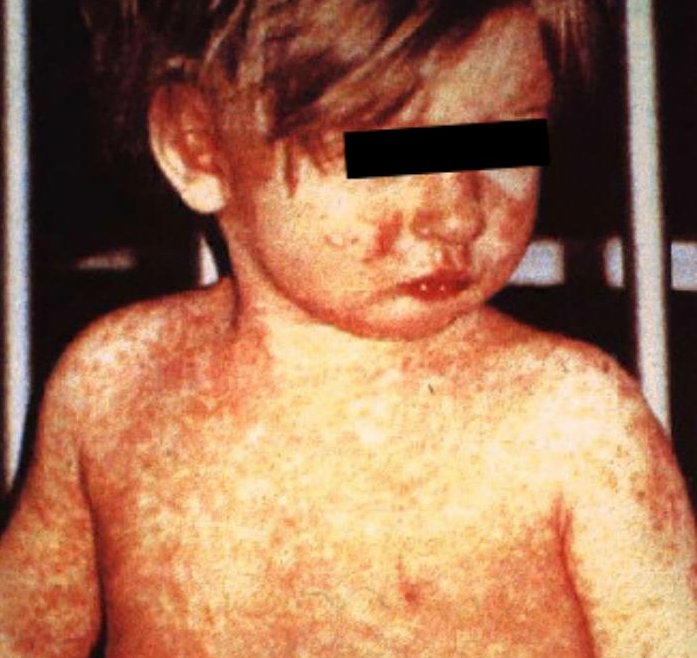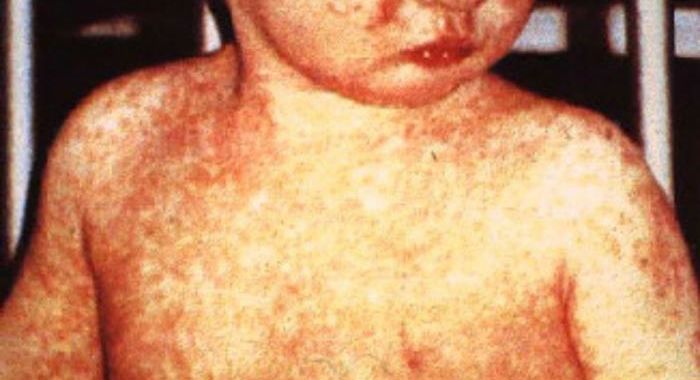
Amid declining vaccination rates nationwide, an outbreak of measles has erupted this week among unvaccinated children at a childcare facility in Columbus, Ohio.
The outbreak has sickened at least four children so far, all of whom are unvaccinated with no history of travel, meaning they contracted the highly contagious virus locally, according to Columbus-area health officials. An investigation into the outbreak is ongoing. Health officials are notifying parents and tracing contacts. The childcare facility is cooperating and has temporarily closed.
Columbus CBS affiliate WBNS-TV reported that one of the four cases had been hospitalized in intensive care. Officials also told the outlet that they expect additional cases will be identified in the coming days.
Reached by email on Thursday, a representative for Columbus Public Health told Ars that all four cases are now recovering at home.
The representative did not have current or past information on vaccination rates in the area because it is not reported to the city health department. Ars reached out to the state health department for that information, but a spokesperson said the information was not readily available. We’ll update this post when they come through.
Worrying trends
But previously published data on vaccination rates statewide and nationwide show clear declines amid the pandemic. Earlier this year, the Centers for Disease Control and Prevention published an analysis finding that vaccination coverage among kindergartners declined by one percentage point between the 2019-2020 school year and 2020-2021, falling from approximately 95 percent to 94 percent.
In Ohio, the decline was sharper statewide. In the 2019-2020 school year, 92.4 percent of kindergartners had been vaccinated for measles, mumps, and rubella (MMR). But in the 2020-2021 school year, coverage fell to 89.6 percent.
Columbus Public Health Commissioner Dr. Mysheika Roberts told WBNS that she had noted a trend among local parents who declined to get their children vaccinated. “The most important thing you can do to protect against measles is to get vaccinated with the measles-mumps-rubella (MMR) vaccine, which is safe and highly effective,” Roberts said.
The outbreak, though still small and localized, fuels anxiety among public health officials over the hold antivaccine sentiments have in the country. While antivaccine views had insidiously spread for years before the pandemic, they mushroomed into the mainstream amid a flood of misinformation and politicization of public health that followed COVID-19. As Republican lawmakers lashed out against COVID-19 vaccine mandates and other health measures intended to lower transmission and prevent deaths and illness, the efforts spilled over to routine vaccination.
In Ohio, for instance, Republican lawmakers introduced a sweeping antivaccine bill last year that would essentially override all vaccination requirements in the state, allowing people to decline vaccines simply by stating “reasons of conscience.” The bill, which was supported by testimony from a doctor who falsely claimed COVID-19 vaccinations cause people to become magnetic, has since stalled in committee. Still, this year, at least 25 states have considered dozens of bills to roll back childhood vaccination requirements.
Preventable
For now, vaccination rates on national and most state levels are fair, often below the target of 95 percent, but still generally strong. However, as the ongoing polio outbreak in New York has demonstrated, decent overall vaccination rates can hide pockets of dramatically under-vaccinated communities. One area of a polio-affected county in New York, for instance, has a polio vaccination rate among children under 24 months old as low as 37 percent. That same county, Rockland, also had an explosive measles outbreak in 2019.
The pockets of low vaccination could fuel continued bursts of dangerous, vaccine-preventable disease spread, chipping away at the success of mass vaccination campaigns, one of the biggest triumphs of modern public health. The spread of polio and measles is particularly concerning—they’re both highly contagious and dangerous.
Measles can spread by coughing, talking, or simply being in the same room as someone with the virus. Ninety percent of unvaccinated people who are exposed will become ill, and 1 in 5 will require hospitalization, Ohio’s Franklin County health department noted in a press release (Franklin County encompasses Columbus).
“Measles is both highly contagious and preventable,” Joe Mazzola, Franklin County health commissioner, said in the release. “It can be a severe illness, so we strongly encourage anyone who has not been vaccinated to get vaccinated to prevent further spread.”







